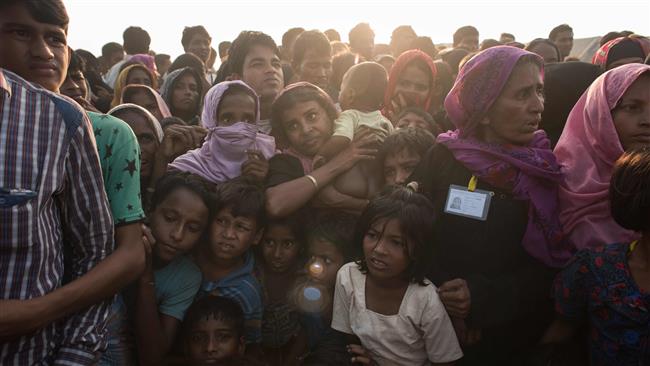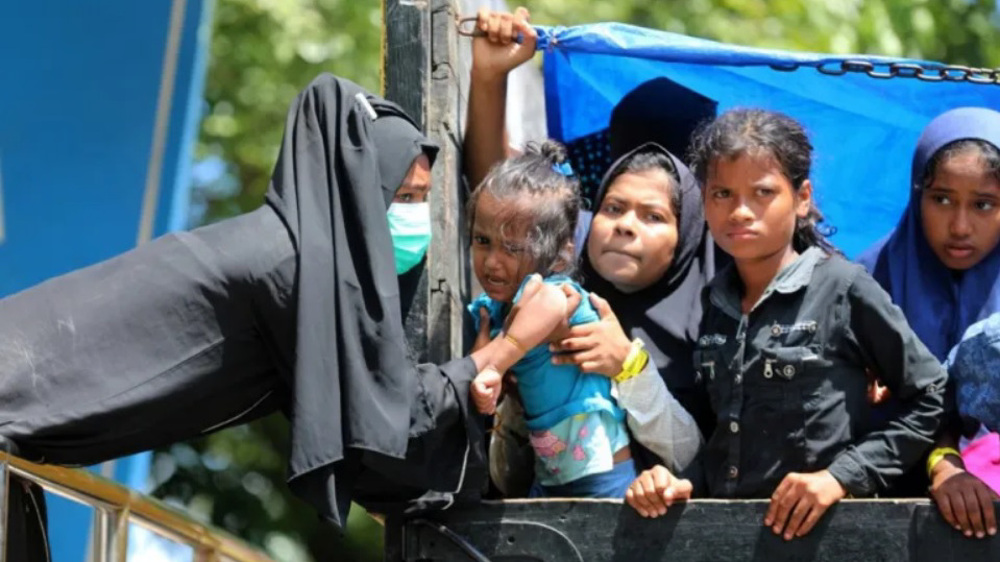Rohingya at risk of deadly diphtheria face shortage of medics: MSF
An international medical charity says health workers in Rohingya refugee camps in Bangladesh are struggling with a shortage of medics to administer antitoxins to patients infected with diphtheria.
Doctors Without Borders, the lead agency dealing with an outbreak of the bacterial disease in camps sheltering the Myanmar's persecuted Muslim refugees, said on Thursday that it had managed to provide antitoxins to only around 12 patients daily due to the lack of trained medics.
Crystal van Leeuwen, an MSF emergency medical coordinator now in Cox’s Bazar where the refugee camps are located, said that the agency was also facing shortages of antitoxins.
“Once we do have enough people and other organizations start to administer as well, we may get into a situation where we don’t have enough antitoxins anymore,” media outlets quoted Leeuwen as saying
“It’s a double-edged sword. We need both the human resources to administer it, and we need more antitoxins at the same time,” she noted.
Doctors Without Borders, known by the French acronym MSF (Medecins Sans Frontieres), says it has treated around 2,000 patients in the past few weeks and is receiving around 100 new cases daily.
The bacterial disease has killed nearly two dozen people in densely populated camps over the past few weeks.
Also on Thursday, the British government said it was sending a team of more than 40 doctors, nurses and firefighters to Cox’s Bazar for six weeks to deal with the diphtheria outbreak following a request by the World Health Organisation (WHO) and the Bangladeshi government.
The WHO describes diphtheria as a widespread, severe infectious disease with epidemic potential and a mortality rate of up to 10 percent.
MSF has called diphtheria a disease “long forgotten in most parts of the world thanks to increasing rates of vaccination”.
Aid agencies say measures are urgently needed to stop the spread of diphtheria. The refugees live in crowded camps and shacks made from bamboo and plastic sheets, with poor access to clean water, sanitation and health services.

Rohingya plight
Backed by Myanmar’s government and Buddhist majority, the military launched yet another heavy-handed crackdown against the Muslim minority in Rakhine State on August 25, using alleged armed attacks on military posts as the pretext.
Over the past three months, government troops have been committing killings and rapes, making arbitrary arrests, and carrying out mass arson attacks to destroy houses in Rohingya villages in Rakhine.
Only in its first month, the clampdown, called by the UN and prominent rights group an “ethnic cleansing campaign,” killed some 6,700 Rohingya Muslims, including more than 700 children, according to MSF.
More than 700,000 Rohingya Muslims have so far fled the predominantly Buddhist Myanmar to neighboring Bangladesh.
The United Nations has already described the Rohingya as the most persecuted community in the world, calling the situation in Rakhine similar to “a textbook example of ethnic cleansing.”
VIDEO | Elderly Palestinian woman attacked by settlers near Ramallah
VIDEO | Hezbollah holds rallies in solidarity with Iran
Iran warns UN Security Council over explicit US military threats
Araghchi: Recent riots aimed at provoking another US war against Iran
Larijani: Ringleaders of rioters in recent unrest identified, some arrested
VIDEO | Solidarity summit: Global call for Palestinian education
VIDEO | Press TV's news headlines
Hamas says it fulfilled all its obligations under Gaza ceasefire deal










 This makes it easy to access the Press TV website
This makes it easy to access the Press TV website